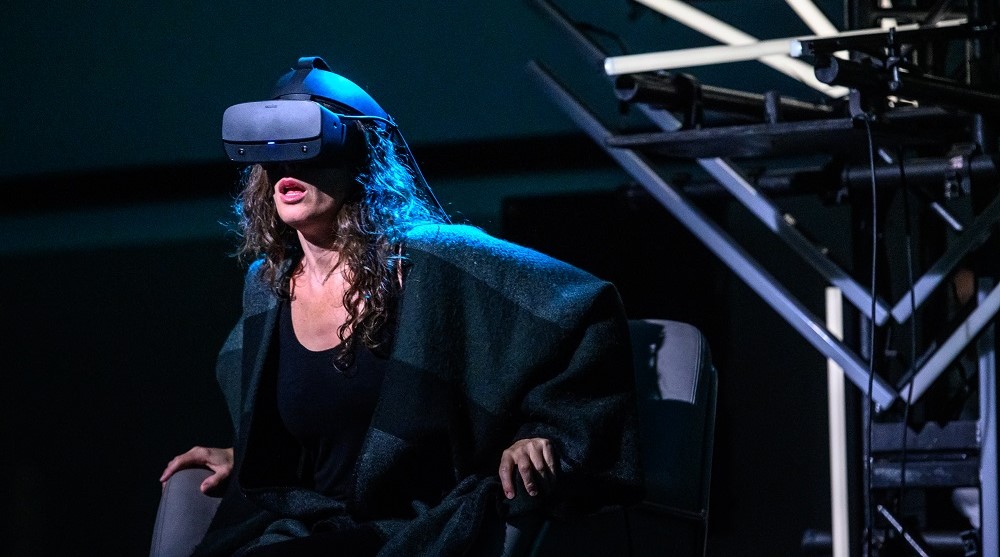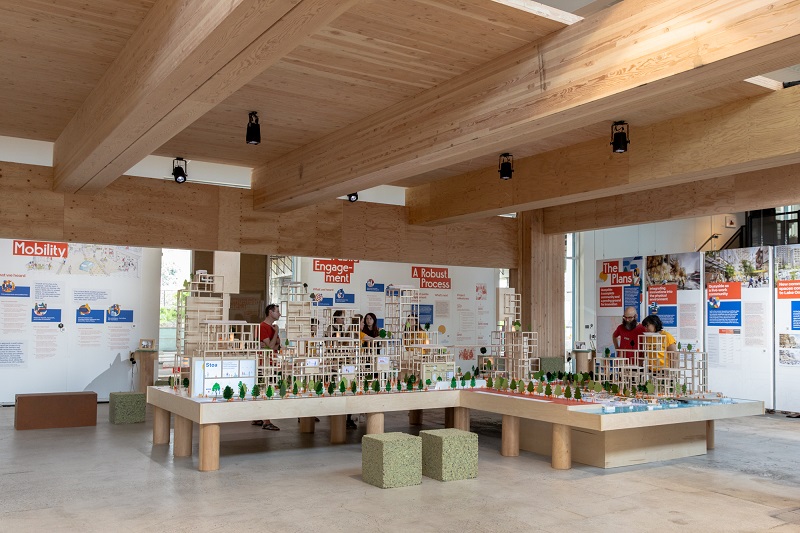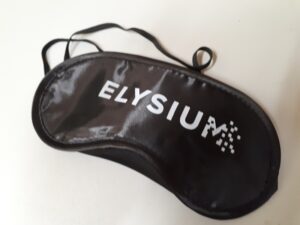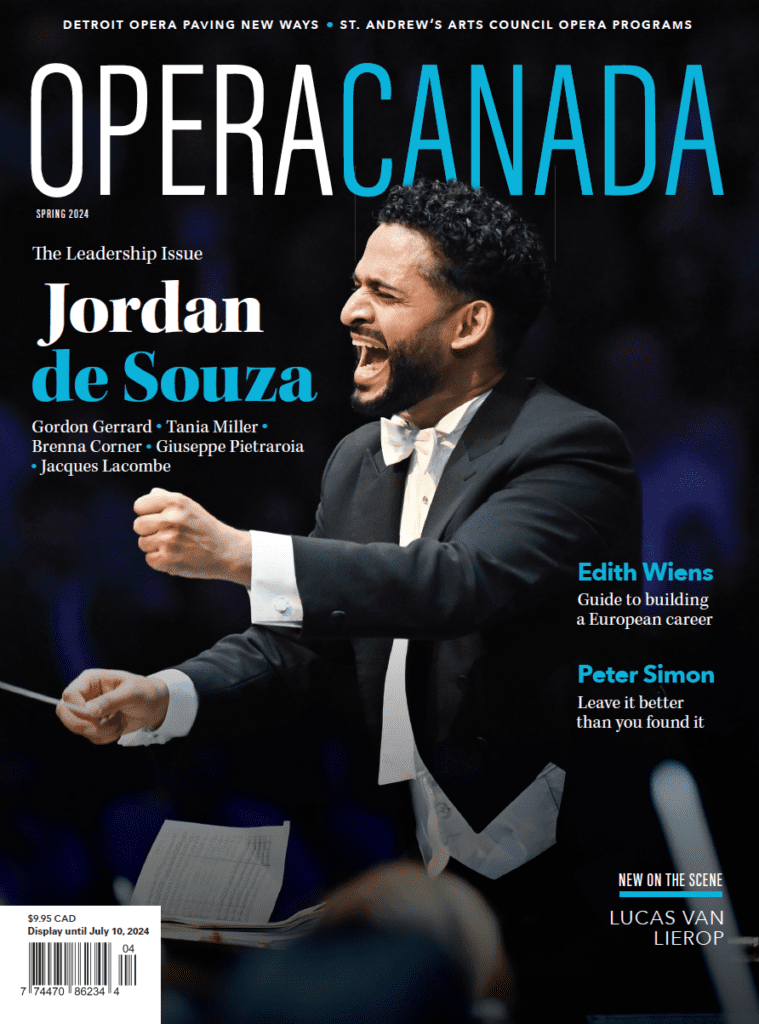Tapestry Opera’s experimental opera series, TAP:EX is back. Conceived as an annual opportunity for operatic experimentation, this year’s installment, Augmented Opera, showcases Tapestry’s love of Black Mirror. Hosted by Alphabet Inc.’s Sidewalk Labs and with some collaboration from re:Naissance Opera, TAP:EX demonstrates Tapestry has the chops to deliver on their vision; at least when they’re allowed to do their own thing.
The amalgamation of interests, particularly Sidewalk Labs’, offers little thematic cohesion beyond vagaries on “technology” and joint-advertisement opportunities meant to tap into the apparently huge overlap of opera fans and urban-planning aficionados. This left an evening segmented into three tenuously connected events: the reception, complete with a tour of Sidewalk Labs, the opera itself, and the post-show reception showcase for re:Naissance’s VR opera concept.
The tour of Sidewalk was fine-enough, but reeked of the at once arrogant and naive tech-topian language that maligns tech-firms. Anyone who’s ever been herded onto a TTC shuttle bus after a subway breakdown can tell you that Toronto sorely needs an urban overhaul, and Sidewalk’s core goal is all well and good: pedestrian and public-transit focused high-density living, the urban planner’s dream. But amid mounting controversies one can’t help wonder why Google is getting in on the real-estate business. An urban planning think-tank is one thing, but with construction soon to start, cynicism about what a tech-firm’s business model is for community-engineering (cynicism the tour’s audience was not shy to voice) is taking root.
But what of the opera itself? Augmented Opera situates the audience at a tech conference for the reveal of “Elysium,” a fictional technology that allows the user to inhabit their memories in their most perfect (if inaccurate) form. The show opens with a tongue-in-cheek monologue jabbing the buzzword-laden showcases tech is so fond of. While not as irreverent as it could or should have been, it was funny-enough and proved the hosting techies have a sense of humour after all.
A nameless volunteer named Eurydice and played by Lauren Segal is brought on stage to test the device. Elysium’s AI chirps an eerily realistic software greeting of “hello old friend,” and we, the audience, are then instructed to don our blindfolds. The dark soundscape (Benton Roark) that follows is both haunting and beautiful, and the unabashed triumph of the evening. The accompanying piano and engineered musical passages (courtesy of Michael Shannon and Guillermo Subauste) are dulcet and foreboding, conjuring to mind a digitized fae-forest of Germanic lore, where one best not trek lest they be ensnared by creatures at once beautiful and cruel. The software’s calming words only heighten the anxiety, as do the stagehands moving in and out of audience with recordings, crafting sonic depth and simulating the ephemerality of memory. As Eurydice’s consciousness boots-up, singing begins. Still blindfolded, these ghostly voices melt away the audience’s anxieties by offering us humanity on which to tether our senses.
This spectral singing is overlayed by a recorded conversation between a man and a woman. The man is so taken by his partner’s beauty that he asks to paint her naked form, to which she happily acquiesces. But as the recording repeats the tones change; the man becomes a little more forceful, a little more callous, and the woman a little more confused and uncomfortable. Not enough for emotional certainty, but enough to give one pause. With nothing to see and only their voices to set the tone, second guessing starts: is something dark afoot? Am I misunderstanding? Was this a mistake? We are left only with a traumatic memory’s frustrating imperfection. It is the best representation I’ve ever seen of the self-doubt women suffer around more subtle kinds of sexual aggressions. Debi Wong and Michael Mori’s blindfolded opera has a lot to offer, and I’d love to see it explored further.
Once the memories synthesize, we are instructed to remove our blindfolds to reveal a much more literal performance. Eurydice is flanked by two doubles representing happy and sad versions of the same romantic memory. These memories, played by Vanessa Oude-Reimerink and Lyndsay Promane respectively, mirror Eurydice’s movements and song in an exquisitely choreographed sequence. All three performers are top-notch, giving their all to their respective emotional states, particularly Promane, whose anguish leaves little to the imagination. The choice to cast the Segal’s Eurydice and her sad alter ego with mezzos but cast Happiness with a soprano is inspired, and Oude-Reimerink’s saccharine joy contrasts cozily with Promane.
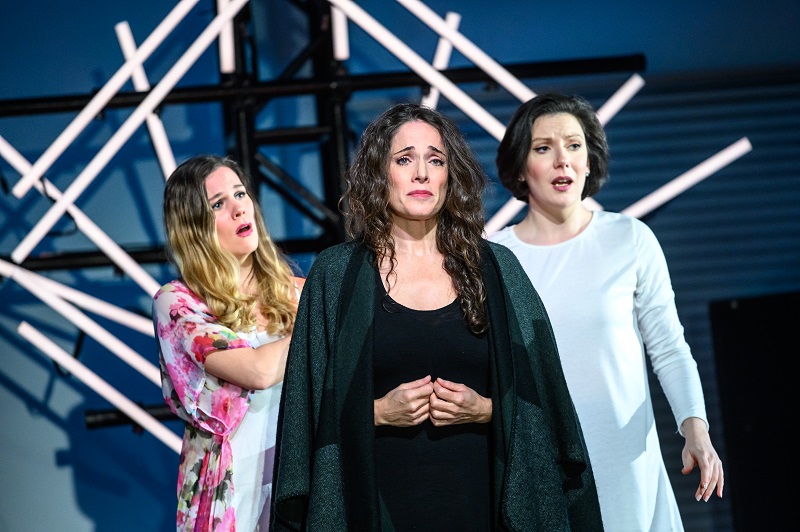
Left to right: Vanessa Oude-Reimerink, Lauren Segal, & Lyndsay Promane in Tapestry Opera’s TAP:EX Augmented Opera—Photo: Dahlia Katz
Unfortunately, once Promane and Oude-Reimerink take their leave the show loses its steam. With the memories synthesized, Eurydice is invited into her heaven, her Elysium paradise constructed from her psyche. Segal returns to the stage, dons an actual VR headset (the contents of which we are privy to via wall projection) and enters an unfinished tech demo. Static polygon hurl does not a heaven make, and the anti-climax was deflating. Worse, Segal, whose voice rang out fully and beautifully all evening, was left a smidge muffled; the result, I assume, of contending with a clunky thing on her face and no longer having an audience to which to emote.
The images on screen came courtesy of re:Naissance Opera. I had the opportunity to test out their project for myself after the show, as did the rest of the audience. A proof-of-concept more than a demo, the images projected in Augmented were a “storyboard” for re:Naissance’s future VR opera. Placeholder music and cartoony drawings tell a mythical love-story between two fae creatures, but the company had little to show besides the concept itself. But hey, that’s fine. And in fairness the demonstration left me genuinely curious and a little excited for the idea of a VR opera. re:Naissance’s idea is ambitious and may create genuinely moving art, but shoehorning it into Tapestry’s show did a disservice to both projects, which were left worse for wear as a result.
So, overall, a weird evening; one that once again proved Tapestry’s talent for melding genres, and the tech industry’s pride for their own ideas. Even when there’s little to show for them.
Sidewalk Labs will host performances of Augmented Opera on Nov. 21st, 22nd, 23rd.

